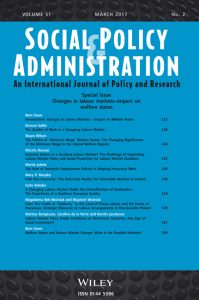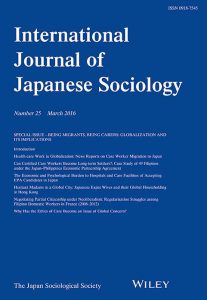Interview with Dr George Baylon Radics, Associate Editor for Sociology Compass
by George Baylon Radics in conversation with Francesca Halstead · Published · Updated

Sociology Compass is delighted to welcome Dr George Baylon Radics as our new Associate Editor for the Crime & Deviance Section. Dr Radics is Senior Lecturer in the Department of Sociology at the National University of Singapore. The Associate Editor role at Sociology Compass is to lead on the commissioning of state-of-the-art review articles under dedicated subject areas. We took the opportunity to talk to George about his research background and aims for the criminology section as he joins the Sociology Compass editorial team.
Please tell us about your research background and how you came to focus on sociology?
I am trained in sociology and law, and I had worked for the courts for a few years before returning to academia. As a consequence, I was initially interested in criminal law, the courts, notions of justice, and human rights. Eventually, I gravitated more towards socio-legal and law & society studies. And because I research crime, I really enjoy teaching courses on—and conducting research in the areas of—deviance, sociology of the law, and my secondary specialisation areas of social theory and emotions. Lastly, I am an American of Southeast Asian descent who chose to train for my PhD in Singapore, so my worldview is grounded in the Global South, particularly Southeast Asia.
What would you consider the most compelling or critical questions for your area of research right now?
I think with Brexit and the rise of Trump, we have seen a precipitous rise in xenophobia, populism, and political extremism. The same pattern is emerging all over the world, with even more severe consequences in the Global South where many of the legal systems have not had the same time to develop or are still grappling with inchoate versions of rights left behind by colonialism.
Furthermore, due to COVID and the spectre of economic recession, legal rights and guarantees may be under threat. Hence, I think more attention should be placed on the types of repression a state may enact to preserve “law and order.” Outside of this, my work over the past decade has been in the area of decolonizing social theory. Thus, recent debates on decriminalizing criminology and social theory is also really exciting to me.
In your view, what does sociological research contribute to society? Why does it matter?
Sociological research, particularly on crime and deviance, has the potential to explore ways to make society less oppressive. Instead of focusing on how to reduce crime and encourage conformity, we should be examining the inequalities in our society that make day-to-day living difficult, and the specific conditions that force some people to cross the line into crime and deviance. This way, we can seek out more humanistic ways to address crime: not just for a society-at-large that must suffer the consequences, but also for the “criminal” or “deviant” who may be trapped in a system that perpetuates it.
As Associate Editor for the Crime & Deviance Section of Sociology Compass, what are you looking for when commissioning and assessing Review Articles?
While important and theoretically robust observations from the Global North have helped to push the sociology of crime and deviance forward, Global South perspectives can also help to balance out the bias and provide critical interventions in ongoing discussions regarding race, indigeneity, gender, sexuality, and urbanization. Commissioning review articles from authors based outside of the Global North will therefore be a priority for me. But I am also interested in new and up-and-coming perspectives for instance in the fields of green criminology and queer criminology, as well as review articles in the relatively neglected areas of white-collar crime, professional crimes, and state crimes.
What inspires you to be involved in Sociology Compass as an AE?
The ability to shape the discipline and push for more Global South perspectives in the study of crime and deviance motivated me to serve as an Associate Editor for Sociology Compass. I think these are exciting times for the journal as it begins to accept original submissions while simultaneously internationalizing its orientation and perspective. The prospect of working with the new editors-in-chief is also especially enticing. Ali Meghji’s work on decolonizing the social sciences is inspiring, and working with Zarine Rocha is a big draw. Zarine is a phenomenal editor whom I really enjoyed working with when she was Managing Editor of the Asian Journal of Social Science.
For readers and researchers new to your discipline, what would you put at the top of their recommended reading list?
I’d recommend an older, yet still relevant piece by Alexander Liazos entitled, “The Poverty of the Sociology of Deviance: Beyond Nuts, Sluts, and Perverts,” published in Social Problems back in 1972. As a socio-legal scholar, I love the work of Boaventura de Sousa Santos, Loïc J.D. Wacquant, Kerry Carrington, and of my Singapore colleagues, Lynette J. Chua, Narayanan Ganapathy, and Pattana Kitiarsa.
Dr Radics takes over this Associate Editor position from Professor Vera Lopez who finishes her term at the end of 2022. We’d like to thank Professor Lopez for her dedication and commitment to leading the Crime & Deviance section since January 2018. You can take a look at the articles published during this term here.






